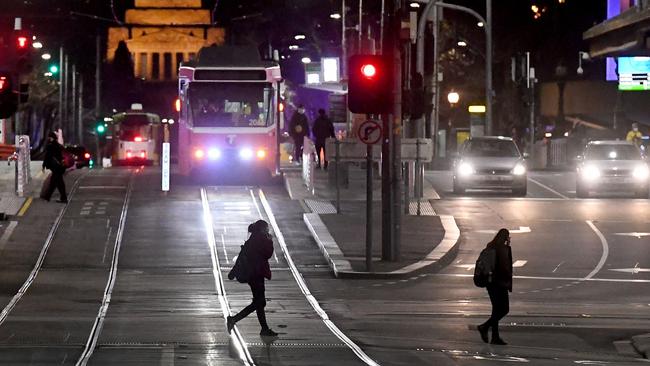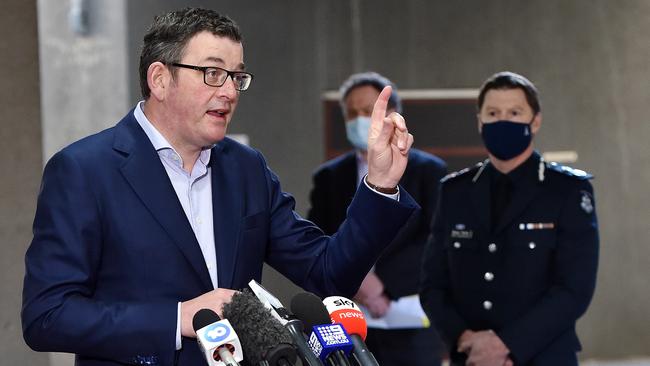
Plain has received preliminary instructions for a legal challenge and it is easy to see why. Along with fellow barrister Jason Harkness she was part of the team led by Marcus Clarke QC that came close to victory last year when they challenged an earlier curfew.
They ran that case, known as Loielo v Giles, not because they wanted to imperil public health but for reasons that are hard to fault: during an emergency everyone needs to comply with the law.
That logic remains sound: the community is required to obey the law and comply with health orders that restrict liberties. So the community has every right to ensure that premiers and health officials comply with laws that limit the circumstances in which those orders can be made.
Nobody likes orders that erode personal freedom. But they are legitimate and deserve respect if one condition is met: they must comply with laws approved by parliament.
If premiers ignore the statutory procedures, their health orders are unlawful – which is exactly what happened last year in New Zealand.
That country’s High Court found that for nine days from late March Prime Minister Jacinda Ardern had imposed an unlawful lockdown. Legislation had vested the power to order lockdowns in New Zealand’s top health official, not Ardern.
The same legal framework applies in Victoria. Curfews in that state cannot be imposed arbitrarily whenever politicians find it convenient. Just like New Zealand, procedures set down in law must be met. And that means Andrews, like Ardern, has no authority to order curfews.
The Victorian and New Zealand parliaments have both vested that power in an authorised health official. The decision in the Loielo case has put that beyond doubt.
If the proposed challenge goes ahead, a victory for the government might depend not just on whether the curfew was ordered by Brett Sutton, the chief health officer.
It could depend on whether Sutton had reasonable grounds for his decision. And that looks dubious given the doubts about whether curfews are effective in curbing the virus.
Epidemiologist Jodie McVernon, of the Doherty Institute, told ABC radio this week: “Personally, I’m not aware of any evidence that proves that curfews per se are particularly efficacious.”

So if this curfew is to survive a legal challenge, Sutton might need to persuade a judge that he was right about the epidemiology and McVernon, who is an expert on this subject, was wrong.
Because Covid-19 looks like being with us forever, scrutiny by the courts is essential to ensure the inevitable erosion of liberty is based on democratic processes and not arbitrary rule.
That requires lawyers of courage – particularly in Victoria. If what happened to Plain and Harkness after the Loielo case is any guide, those who demand adherence to the law risk retribution.
The Loielo challenge exposed them to a campaign of intimidation that is outlined in a file prepared by Marcus Clarke QC that is about to be presented to the Supreme Court’s prothonotary.
The file has also been provided to peak organisations within the legal sector – including Victorian Attorney-General Jaclyn Symes, federal Opposition Leader Anthony Albanese as well as IBAC, Victoria’s Independent Broad-Based Anti-Corruption Commission.
The trouble started when three unknown men tried to break into Plain’s home on the night of September 17 last year – the day after the first directions hearing.
She reported that to Malvern police on September 18 and was then confronted by criticism in the media and federal parliament for taking the case.
There was a clear public interest in Loielo’s challenge – a point recognised by the Supreme Court’s Justice Tim Ginnane. Despite the fact that he dismissed the challenge, the plaintiff, Michelle Loielo, was not required to pay the government’s costs.
Yet some could not get past the fact that Plain and Harkness, who have part-time appointments with the Administrative Appeals Tribunal, were representing a client who was a member of the Liberal Party.
Their tribunal appointments had been made on the basis that they would continue to accept briefs on matters that did not conflict with their duties at the AAT. That condition has not been breached.
Clarke has accompanied the file with a memorandum that leaves no doubt about who he believes is responsible.
He writes that it was “an apparent collaborative effort by certain members of the ALP to suggest that Dr Harkness and Ms Plain had engaged in discreditable conduct.”
On the day of the directions hearing, Clarke writes that Plain and Harkness noticed that their LinkedIn profiles had been reviewed by a staff member of a Labor politician – one of several who named in the memorandum.
Five days later, they received questions from a reporter at The Age that suggested they were acting improperly by representing Loielo while holding positions as part-time members of the AAT, the memo says.
In an amazing coincidence, a subsequent article to that effect quoted the politician whose staffer had reviewed the barristers’ LinkedIn profiles.
Much of the material in Clarke’s file concerns privileged statements in the Senate. But he also records what he believes is evidence of a criminal offence.
He writes that someone appears to have taken a screenshot of the webcast of the Loielo challenge in breach of the Court Security Act. The details have been referred to Victoria Police and the Australian Federal Police, which have both declined to act.
Chris Merritt is vice-president of the Rule of Law Institute of Australia.




When Premier Dan Andrews imposed this week’s curfew on Melbourne, barrister Vanessa Plain started receiving phone calls. Within days, it was clear that this curfew, like its predecessor, was heading for court.